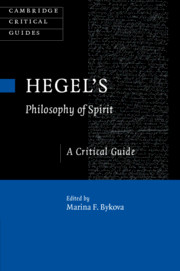Book contents
- Hegel’s Philosophy of Spirit
- Cambridge Critical Guides
- Hegel’s Philosophy of Spirit
- Copyright page
- Contents
- Contributors
- Acknowledgments
- Abbreviations
- Introduction
- Part I Philosophy of Spirit and Hegel’s Philosophical System
- Part II Philosophy of Subjective Spirit
- Part III Philosophy of Objective Spirit
- Part IV Philosophy of Absolute Spirit
- Bibliography
- Index
- Cambridge Critical Guides
Introduction
Hegel’s Encyclopaedia Philosophy of Spirit
Published online by Cambridge University Press: 24 June 2019
- Hegel’s Philosophy of Spirit
- Cambridge Critical Guides
- Hegel’s Philosophy of Spirit
- Copyright page
- Contents
- Contributors
- Acknowledgments
- Abbreviations
- Introduction
- Part I Philosophy of Spirit and Hegel’s Philosophical System
- Part II Philosophy of Subjective Spirit
- Part III Philosophy of Objective Spirit
- Part IV Philosophy of Absolute Spirit
- Bibliography
- Index
- Cambridge Critical Guides
Summary
Hegel’s system of philosophy is perhaps one of his most enduring legacies. Many of his contemporaries, including Fichte and Schelling, attempted to arrange philosophical disciplines into a complex whole, demonstrating their interconnection and organic unity. Yet Hegel was able to accomplish this task in the most comprehensive and consistent way. The work that depicts Hegel’s entire mature system in its basic structure is the Encyclopaedia of the Philosophical Sciences in Basic Outline. This is Hegel’s only published presentation of his fully developed system consisting of three main parts: Logic, Philosophy of Nature, and Philosophy of Spirit. Hegel began developing the contours of his comprehensive “system of philosophy” during his time in Nuremberg (1808–15) where he worked as the headmaster (principal) and philosophy teacher at a city Gymnasium (high school). Apparently, his teaching obligation motivated him to draft an outline of his philosophical system, composing it in the form of successively numbered sections (or paragraphs) (Enc. 1B&D viii). This (encyclopedic) form of presentation was not a novelty; it was rather customary at the time for German professors to write thematic encyclopedias to be used as didactic tools, and Hegel followed this tradition. He lectured on his entire philosophical system with the aid of the composed drafts of the Encyclopaedia twice – in 1811/12 and 1812/13 – while in Nuremberg (cf. GW 13:620ff.) and again – in 1816 – in his first semester as professor of philosophy at the University of Heidelberg.1 However, the printed (book) version of the Encyclopaedia appeared only in the summer of 1817. In its first edition, the Encyclopaedia contained 477 paragraphs and was composed as a complete course outline to serve as a basic text for students attending Hegel’s lectures.
- Type
- Chapter
- Information
- Hegel's Philosophy of SpiritA Critical Guide, pp. 1 - 8Publisher: Cambridge University PressPrint publication year: 2019

